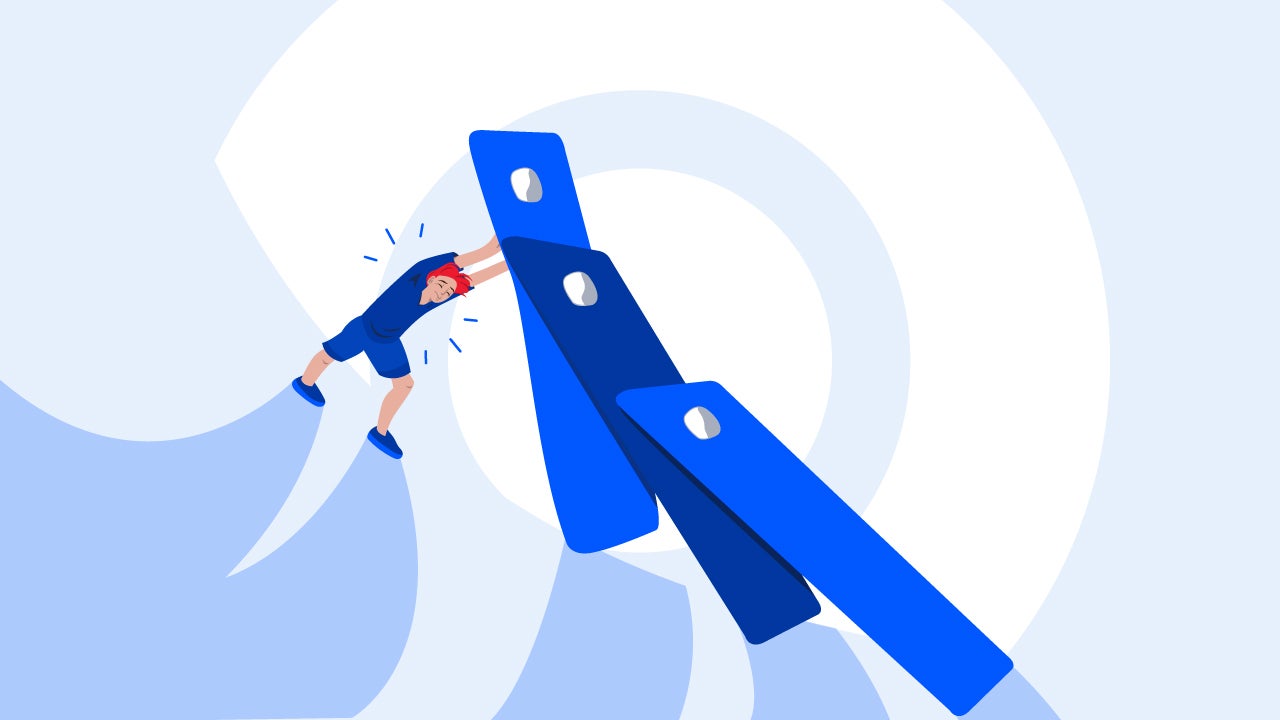The best debt consolidation loans for bad credit in 2025




Key takeaways
- A debt consolidation loan is primarily meant to save money on interest by securing a lower APR and a shorter payoff timeline.
- Bad credit debt consolidation loans may not be as effective due to the higher interest rates.
- Improve your chances of getting a good deal by checking your credit report for errors, raising your score, shopping around and looking into secured options.
Debt consolidation is a debt management strategy that allows you to combine multiple debts into a single account. Although it may be tough to get this type of loan with bad credit, these steps can increase your loan approval odds.
Debt consolidation loans can make it easier for you to get out of debt. You’ll only have to worry about managing one account, potentially with a lower interest rate. Plus, managing a debt consolidation loan well can help you improve your credit score.
The best bad-credit lenders for debt consolidation
| Lender | Best for | Est. APR | Loan amount | Loan term | Min. credit score |
|---|---|---|---|---|---|
| Avant | Consolidating a small amount of debt | 9.95%-35.99% | $2,000–$35,000 | 24–60 months | 550 |
| Best Egg | Direct-to-creditor funding option | 6.99%-35.99% | $2,000–$50,000 | 36–60 months | 600 |
| Upstart | Consumers with little credit history | 6.50%-35.99% | $1,000–$75,000 | 36 or 60 months | No Requirement |

Avant
-
Avant is best if you need to consolidate a small to midsize debt load. The maximum amount you can borrow is $35,000 — the lowest on our list of debt consolidation loans for bad credit. If approved, you could receive funds as fast as the next day. Plus, Avant allows you to manage your loan via its mobile app.
-
Pros
- Quick funding.
- Mobile app.
- No prepayment fee.
Cons
- High maximum rates.
- Administration fee up to 9.99 percent.
- Lower maximum loan amount.

Best Egg
-
Best Egg can send funds directly to your creditors, which streamlines the debt consolidation process. Once approved, you can receive funds as early as the next business day.
-
Pros
- Direct payment to creditors.
- Option to prequalify.
- No prepayment penalty.
Cons
- Origination fee up to 9.99 percent.
- High maximum rates.
- No autopay discounts.

Upstart
-
Upstart might be a good choice if you have a thin credit profile — you don’t necessarily need a credit score to qualify. The lender uses an untraditional approval model, looking at factors outside of your credit, like your education and employment.
-
Pros
- Considers nontraditional factors.
- High loan amount.
- Fast funding.
Cons
- Origination fee up to 12 percent.
- No joint or co-signer option.
- Limited repayment terms.
How to get a debt consolidation loan with bad credit
If you’re struggling to get out of debt and think a debt consolidation loan can help, consider following these steps to find the right debt consolidation loan for your situation. FICO defines bad credit as a score that’s 579 or lower, though many lenders set the threshold for bad credit higher.
1. Check and monitor your credit score
Check with your bank or credit card issuer to see if it offers free tools for checking your credit score.
Lenders base loan decisions largely upon the condition of your credit. Generally, the lower your credit score, the higher the interest rates lenders will offer you on financing.
Many banks offer free tools that allow you to check and monitor your credit score. Once you know your credit score, it’s easier to identify lenders that may be willing to work with you. There are lenders specializing in bad credit loans, and many list credit score requirements on their websites, which can help narrow down your choices.
2. Shop around
Compare your loan options from multiple lenders to find the best debt consolidation loan for your needs. Go to each lender’s website to learn about its products and qualification requirements.
It’s rarely a good idea to accept the first loan offer you see. Instead, do your research and compare loan amounts, repayment terms and fees from multiple sources. Prequalify with at least three lenders to view your potential rates without a hard credit check.
You can find these loans at local banks, credit unions and online lenders. This process can take time, but it might save you hundreds, if not thousands, of dollars.
3. Consider a cosigner, joint loan or a secured loan
To increase your loan approval odds and chances of landing a lower rate, use a cosigner or co-applicant or shop around for a secured personal loan.
If you’re having a hard time qualifying for a regular debt consolidation loan, it might be worth taking out a secured loan or asking a creditworthy friend or family member to cosign or apply as a co-applicant.
- Cosigned loans. Cosigners share legal responsibility for the loan, but not ownership. Signing the loan documents with a creditworthy family member or friend can both increase your approval odds and lower your interest rate.
- Joint loans. Joint applicants (also called co-borrowers or co-applicants) take on the debt with the primary borrower and have joint ownership of the balance.
- Secured loans. These loans require some form of collateral, such as a vehicle, home or another asset. If you default, the lender will seize the collateral to recoup its funds. Because of this, getting approved for a secured loan is typically easier than an unsecured one, and you may even qualify for a better interest rate.
Alternatives to consolidating debt with bad credit
If you cannot get a debt consolidation loan, you have other options. If you haven’t already, start by trying to adjust your budget and spending habits to pay off your debt. Homeowners with equity can see if they qualify for a cash-out refinance or home equity loan to get funds that can be used to pay off debt.
If budget adjustments and alternatives for getting extra cash don’t work, it may be time to consider debt settlement or filing for bankruptcy. You can contact lenders to see if they are willing to negotiate your debt at all. They may be willing to offer you a discount if you pay it all off now or offer you a payment plan. Filing for bankruptcy means going to federal court to get debts discharged, but it should only be used if you have exhausted all other options.
Pros and cons of a debt consolidation loan with bad credit
If you have bad credit, debt consolidation’s cons may outweigh the pros. Make sure to run the numbers before committing.

Pros
- Potential to get a lower interest rate.
- Simplify debt payments.

Cons
- Not easy to qualify for a debt consolidation loan with bad credit.
- May not find a lower interest rate.
- Fees may force you to borrow more than you owe.
Where to get a debt consolidation loan for bad credit
With so many lenders out there, it can be overwhelming trying to decide where to begin. Here are some good places to start your search when choosing the right debt consolidation lender.
Credit unions and local banks
If you’re a local bank customer or a credit union member, you can talk to a loan officer about whether you qualify for a personal loan — and what the rate and terms are if you do. The institution may look beyond your low credit score and consider your entire financial history, personal circumstances and relationship you have with them to approve you for the loan.
Online lenders
Online lenders are good places to look for debt consolidation loans if you have bad credit. They offer bad-credit loans and generally have more flexible eligibility criteria than a traditional bank. However, online lenders typically charge high APRs and origination fees for bad-credit debt consolidation loans.
Watch out for predatory lenders
Predatory loans are those that benefit the lender at the borrower’s expense. Predatory lenders are rather common in the bad credit space, as these companies take advantage of borrowers’ limited ability to secure a loan through the conventional route to push risky credit products on them. The warning signs include:
- Triple-digit interest rates and equally exorbitant fees.
- Pressure to act quickly.
- The lender asks you to lie on your application.
- The fees or terms suddenly change at closing.
Accepting such a loan can be extremely expensive and may cause you to go deeper into debt. Plus, using a predatory lender defeats the purpose of a debt consolidation loan, which is to make it easier for you to get out of debt, as you’ll have a harder time keeping up with the higher payments.
Bottom line
Getting a consolidation loan with a less-than-stellar credit score may be more difficult, but it’s not impossible. Certain lenders cater to borrowers with low credit, or you can apply for a traditional personal loan with a cosigner or applicant. Regardless of whichever option you choose, make sure the loan is legitimate. It’s not uncommon to see loans with predatorily high rates presented as bad credit loans.
Why we ask for feedback Your feedback helps us improve our content and services. It takes less than a minute to complete.
Your responses are anonymous and will only be used for improving our website.




